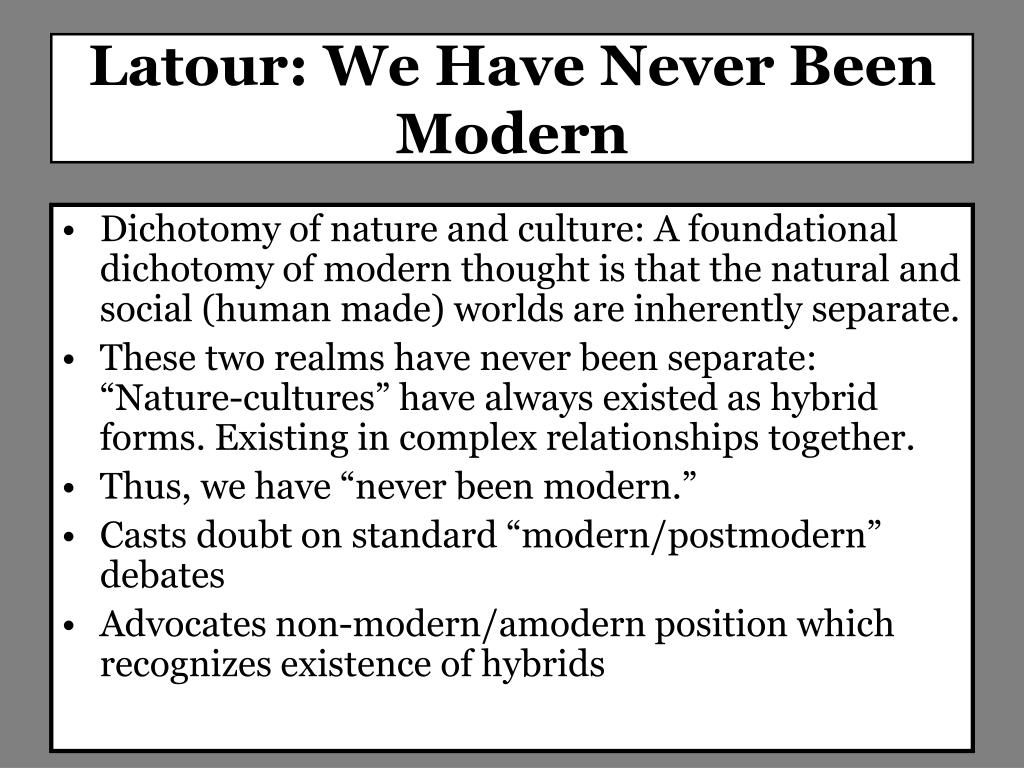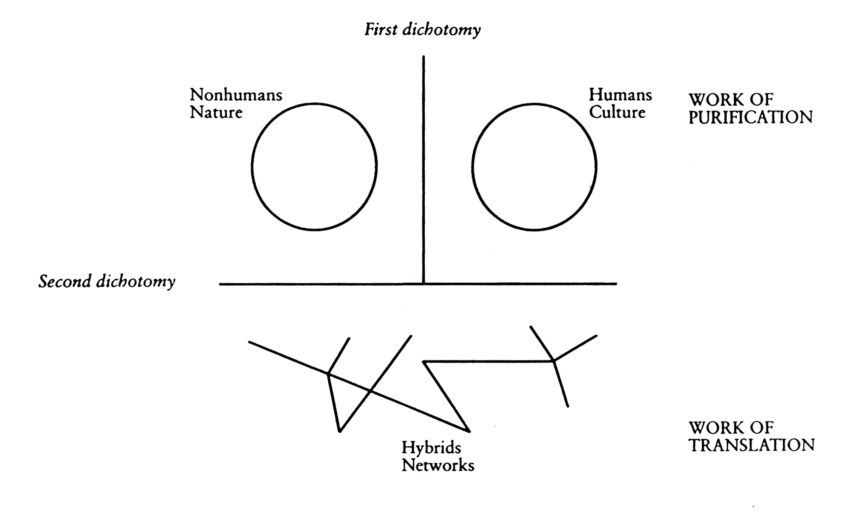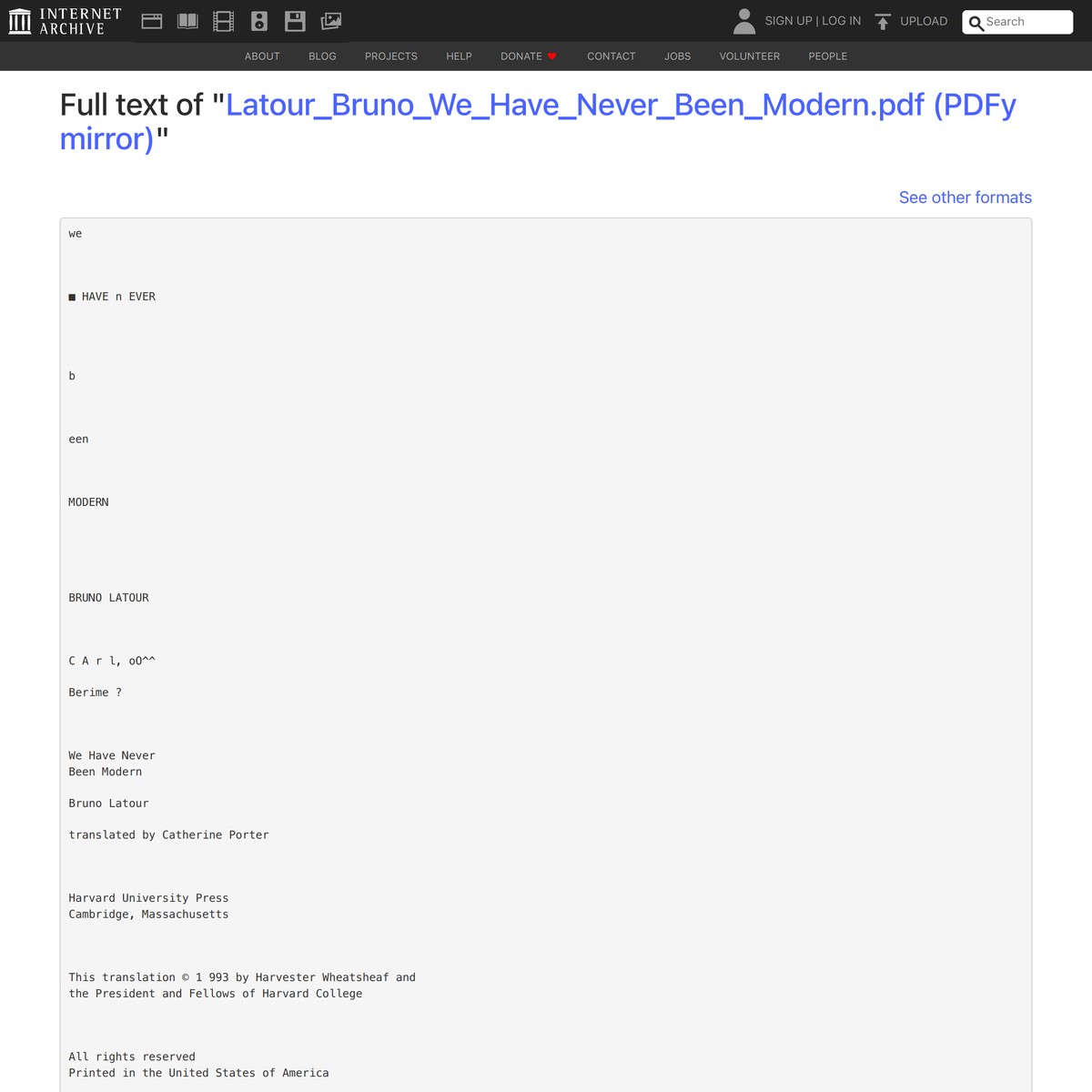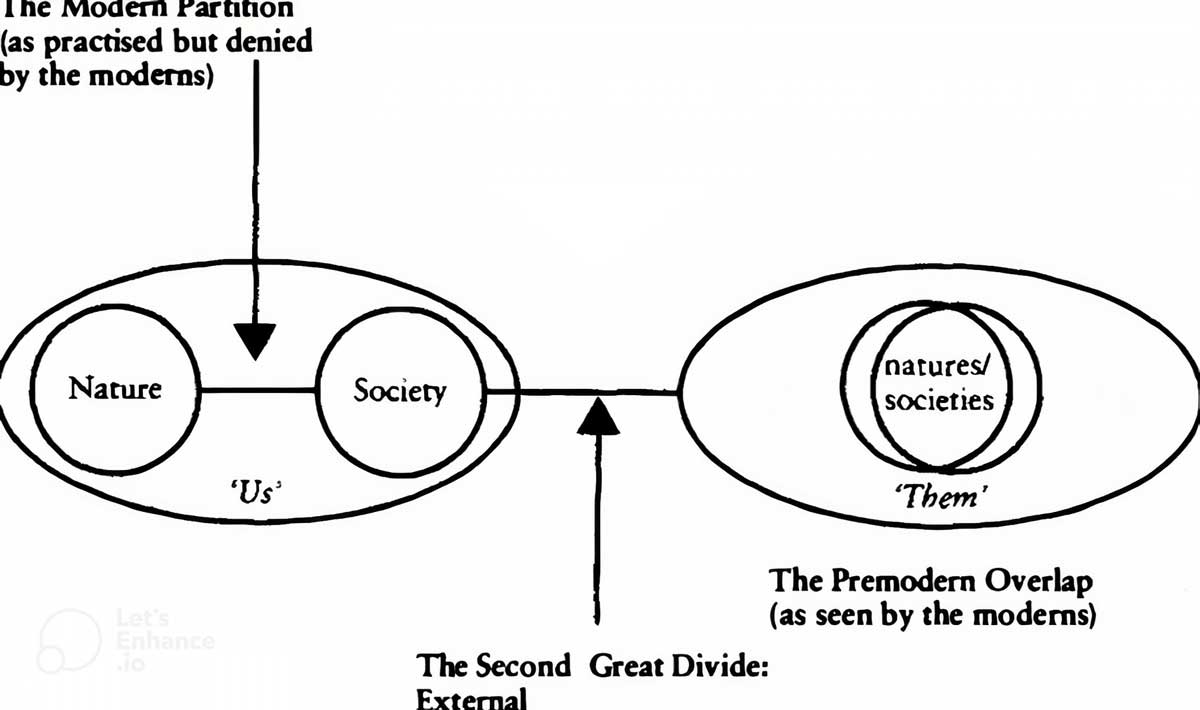
PPT Perspectives on (post)modernity Elias, Bauman, Latour PowerPoint Presentation ID5771518
We Have Never Been Modern (review) We Have Never Been Modern. Bruno LaTour. Translated by Catherine Porter. Cambridge, Mass.: Harvard University Press, 1993. Pp. ix + 157. $29.95 (cloth); $12.95 (paper). Bruno Latour's Science in Action (1987) was the most important book on science, technology and their intertwining with society published in.

Diagram of purification and mediation by Bruno Latour, in We Have Never... Download Scientific
Bruno Latour's 1993 We Have Never Been Modern is a neglected masterpiece. Its argument is compressed, the terminology idiosyncratic. Latour is witty, ironic, and funniest when he's outraged. It's not an easy book, but it's worth the effort. As a diagnosis of us "moderns," it's more penetrating, and rings truer, than many better-known works.

We Have Never Been Modern Brussels Circle for General Semantics
Written by people who wish to remain anonymous. Latour's We Have Never Been Modern kind of spoils the plot in the title, but basically, the thrust of the work is exactly that: that we never really have been modern. By modern, he doesn't mean current or contemporary, but rather, he expresses modernism as the belief that current time is.

We Have Never Been Modern by Bruno Latour 1993 PDF
The moderns, then, are those who exchange the complexity of the local for the simplicity of the global. Of course, Latour suggests that "we have never actually been modern.". What he means is that our lived experience has never in fact corresponded with this separation, since our daily existences are subtended by a hybrid reality that.

Bruno Latour We Have Never Been Modern Paperback BOOK 1993 Harvard Press eBay
We Have Never Been Modern. Bruno Latour. Translated by Catherine Porter. Paperback. eBook. ISBN 9780674948396. Publication date: 10/15/1993. Request exam copy. With the rise of science, we moderns believe, the world changed irrevocably, separating us forever from our primitive, premodern ancestors.

Latour, We Have Never Been Modern Xenotheka
We have never been modern Bookreader Item Preview. We have never been modern by Latour, Bruno. Publication date 1993 Topics Science -- Social aspects, Technology -- Social aspects, Science -- Philosophy, Science -- History Publisher Cambridge, Mass. : Harvard University Press

We have never been modern Latour, Bruno knihobot.sk
"We Have Never Been Modern" by Bruno Latour is a brilliant interdisciplinary work that profoundly challenges our assumptions about the world we live in. Mr. Latour views the Enlightenment from an anthropological perspective to reveal how its multiple and contradictory ideals have conspired to lead humanity towards ever greater social and.
We have never been modern brunolatour.fr
"We Have Never Been Modern" by Bruno Latour is a brilliant interdisciplinary work that profoundly challenges our assumptions about the world we live in. Mr. Latour views the Enlightenment from an anthropological perspective to reveal how its multiple and contradictory ideals have conspired to lead humanity towards ever greater social and.

Bruno Latour We Have Never Been Modern PDF
We Have Never Been Modern. Bruno Latour. Harvard University Press, Oct 1, 2012 - Science - 157 pages. With the rise of science, we moderns believe, the world changed irrevocably, separating us forever from our primitive, premodern ancestors. But if we were to let go of this fond conviction, Bruno Latour asks, what would the world look like?

Full text of “Latour_Bruno_We_Have_Never_Been_Modern.pdf (PDFy mirror)” — Are.na
We Have Never Been Modern. B. Latour. Published 1991. Philosophy, Political Science. What makes us modern? This is a classic question in philosophy as well as in political science. However it is often raised without including science and technology in its definition. The argument of this book is that we are modern as long as we split our.

Why Did Bruno Latour Claim that “We Have Never Been Modern”?
We Have Never Been Modern is a 1991 book by Bruno Latour, originally published in French as Nous n'avons jamais été modernes:. Latour, Bruno. 1993. We Have Never Been Modern. Cambridge, Mass: Harvard University Press. p.50,54,66,101, This page was last edited on 16.

We have never been modern Latour, Bruno knihobot.sk
We Have Never Been Modern. Bruno Latour. Harvard University Press, Oct 15, 1993 - History - 157 pages. With the rise of science, we moderns believe, the world changed irrevocably, separating us forever from our primitive, premodern ancestors. But if we were to let go of this fond conviction, Bruno Latour asks, what would the world look like?

Episode 169 Bruno Latour We Have Never Been Modern — Philosophize This!
Philosophize This! Clips: https://www.youtube.com/@philosophizethisclipsGet more: Website: https://www.philosophizethis.org/Patreon: https://www.patreon.com/.

Bruno Latour, We Have Never Been Modern, translated by Catherine Porter. Hemel Hempstead
Bruno Latour. Bruno Latour, a philosopher and anthropologist, is the author of Reassembling the Social: An Introduction to Actor-Network Theory, Our Modern Cult of the Factish Gods, An Inquiry into Modes of Existence, and many other books. He curated the ZKM exhibits ICONOCLASH and Making Things Public and coedited the accompanying catalogs.

Week 2 Bruno Latour We Have Never Been Modern YouTube
We Have Never Been Modern, by Bruno Latour. Cambridge, MA: Harvard University Press, 1993. $29.25 (cloth); $12.95 (paper). February 11, 1992, 9:50 a.m.: a military aircraft, type F-16, a few minutes after. We Have Never Been Modern is a little masterpiece. In fewer than 200 pages Latour

Introduction and Index To We Have Never Been Modern by Bruno Latour emptywheel
Reviewed by: We Have Never Been Modern. T. Hugh Crawford (bio) Bruno Latour, We Have Never Been Modern. Translated by Catherine Porter. Cambridge, Mass: Harvard University Press, 1993. 157 pp. $29.95. In "Postmodernism, or the Cultural Logic of Late Capitalism"—an essay that has become the touchstone for discussions of contemporary.
- I Have Send Or Sent
- De Vloek Van De Woestewolf
- Hoeveel Weegt Een Kogel Bij Kogelstoten
- Two Rooms And A Boom Game
- Jermaine Stewart We Don T Have To Take Our Clothes Off
- Citroen C3 Aircross 2e Hands
- Au Petit Versailles Du Marais
- De Berckt 1 5991 Pd Baarlo
- Carte D Or Ijs Waar Te Koop
- Hoelaat Moet Max Verstappen Zondag